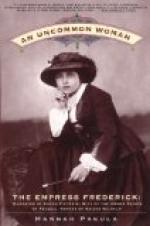“It is, alas! but too true, Natalie,” said Paulo, with a sad smile.
“Then never let me become acquainted with such a world,” said the young maiden, clinging to Paulo’s arm. “Let me always remain here in our solitude, which none but good people can share with us. For Marianne is good, as also Cecil, your servant; and Carlo—oh, Carlo would give his life for me. He is not false, like other people; I can confide in him.”
“Think you so!” asked Paulo, looking deep into her eyes with a scrutinizing glance.
She bore his glances with a cheerful and unembarrassed smile, and a roguish nod of her little head.
“You must certainly wish to paint me again, that you look at me so earnestly. No, Paulo, I will not sit to you again, you paint me much too handsome; you make an angel of me, while I am yet only a poor little thing, who lives but by your mercy, and does not even know her own name!”
“Angels never have a name, they are only known as angels, and need no further designation. As there is an Angel Gabriel, so there is an Angel Natalie!”
“Mocker,” said she, laughing, “there are no feminine angels! But now come, be seated. Here is my guitar, and I will sing you a song for which Carlo yesterday brought me the melody.”
“And the words?” asked Paulo.
“Well, as to the words, they must come in the singing—to-day one set of words, to-morrow another. Who can know what glows in your heart at any given hour, and what you may feel in the next, and which will escape you in words unknown to yourself, and which unconsciously and involuntarily stream from your lips.”
“You are my charming poetess, my Sappho!” exclaimed Paulo, kissing her hand.
“Ah, would that you spoke true!” said she, with sparkling eyes and a deeper flush upon her cheeks. “Let me be a poetess like Sappho, and I would, like her, joyfully leap from the rocks into the sea. Oh, there are yet poetesses—Carlo has told me of them. All Rome now worships the great improvisatrice, Corilla. I should like to know her, Paulo, only to adore her, only to see her in her splendor and her beauty!”
“If you wish it, you shall see her,” said Paulo.
“Ah, I shall see her then!” shouted Natalie, and, as if to give expression to her inward joy, she touched the strings of her guitar, and in clear tones resounded a jubilant melody. Then she began to sing, at first in single isolated words and exclamations, which constantly swelled into more powerful, animated and blissful tones, and finally flowed into a regular dithyramb. It was a song of jubilee, a sigh of innocence and happiness; she sang of God and the stars, of happy love, and of reuniting; of blossom, fragrance, and fanning zephyrs; and in unconscious, foreboding pain, she sang of the sorrows of love, and the pangs of renunciation.
All Nature seemed listening to her charming song; no leaflet stirred, in low murmurs splashed the waves of the fountain by which she sat, and occasionally a nightingale wailed in unison with her hymn of rejoicing. The sun had descended to a point nearer the horizon, and bordered it with moving purple clouds. Natalie, suddenly interrupting her song, pointed with her rosy fingers to the heavens.




